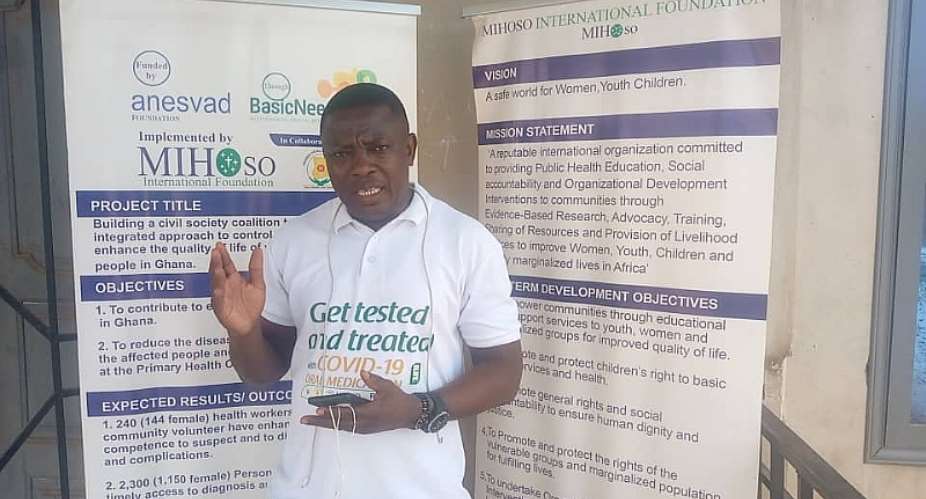People suffering from Skin Neglected Tropical Diseases (NTDs) in the Dormaa Municipality of the Bono Region have appealed for government support to enhance their socio-economic livelihoods.
They said they needed such assistance to go into viable economic activities to empower them to access medication and treatment, and also for the upkeep of themselves and their families.
The patients are infected with Buruli Ulcer, yaws, lymphatic filariasis (elephantiasis) and leprosy, with others also suffering from psycho-social and mental health problems.
In an interview with the media at Maasu, near Dormaa-Ahenkro during a capacity building training, Madam Yaa Nyamekye, the spokesperson said the more than 21 affected people were neglected and highly stigmatized because of the wrong public perception about the NTDs.
The public believed the skin-NTDs are linked or traced to witchcraft and wizardry and family curse and thereby making life uncomfortable, she stated.
Madam Nyamekye said the affected people, mostly spread across Aboabo Number One, Aboabo Number Two, Aboabo Number Three, Ahyiraso, Maasu, Toforo, Kofiasu, Asekasu and Babianeha farming communities, needed more support fend for themselves and their families.
The MIHOSO International Foundation, and BasicNeed Ghana, NGOs organised the training as part of an NTDs project both organisations are implementing in the Dormaa Municipality aimed at enhancing the quality of life of vulnerable and affected people in the area, and being funded by the Anesvad Foundation.
Titled “Building Civil Society Coalition to Advocate an Integrated Approach to Control skin-NTD and Enhance the Quality of Life of Vulnerable and affected people in Ghana”, the two-year project sought to contribute towards prevention, control and elimination of the NTDs infection, ameliorating the mental health and psychosocial impact of debilitating the disease and social stigma.
Madam Nyamekye said though the project implementation had supported some of the affected people to engage in economic activities, they needed more assistance from the government and other NGOs to make life better for them.
She commended MIHOSO and its partners for their support, and called for intensified public education on the NTDs to help address the wrong misconception society had about the NTDs and to control the attendant high stigma and discrimination.
Mr Daniel Owusu-Amponsah, the Dormaa Municipal Disease Control Officer said the NTDs had been endemic in about 30 farming communities in the municipality since 2010, saying last year the municipality recorded eight confirmed cases of Buruli Ulcer.
The confirmed cases were out of the 17 suspected Buruli Ulcer cases where samples were picked for testing.
Mr Owusu-Amponsah said it was untrue that the NTD’s were linked to satanism, and advised affected people from visiting prayer camps and shrines to seek a cure but instead report to the nearest health facilities for medical treatment.
Besides Buruli ulcer, he said the municipality had also recorded three confirmed cases of leprosy with several cases of elephantiasis.
Mr Thomas Benarkuu, the Deputy Chief Executive Officer in-charge of Operations, MIHOSO, explained the project had already trained 10 community volunteers and 26 health workers who reached out and sensitized the communities.
The project implementation would contribute to progress towards the Universal Health Coverage and skin health for all as well as enhance health and wellbeing, eliminate discrimination and exclusion, deepen human rights, and improve participation and productivity.





 France bans election weekend rallies, extends curfew in New Caledonia
France bans election weekend rallies, extends curfew in New Caledonia
 Mauritanians vote in presidential election with incumbent tipped to win
Mauritanians vote in presidential election with incumbent tipped to win
 At least 30 killed in Kenya anti-government protests: HRW
At least 30 killed in Kenya anti-government protests: HRW
 Saglemi project rots while Ghanaians struggle for affordable housing
Saglemi project rots while Ghanaians struggle for affordable housing
 June 29: Cedi sells at GHS15.57 to $1, GHS14.59 on BoG interbank
June 29: Cedi sells at GHS15.57 to $1, GHS14.59 on BoG interbank
 Cedi will stabilize against US dollar after successful debt restructuring — Econ...
Cedi will stabilize against US dollar after successful debt restructuring — Econ...
 We can't allow unpatriotic people to inflict hardship on Ghanaians — Prof Gyampo...
We can't allow unpatriotic people to inflict hardship on Ghanaians — Prof Gyampo...
 ‘Significant initial victory’ — Ablakwa reacts to NPRA’s order halting SSNIT hot...
‘Significant initial victory’ — Ablakwa reacts to NPRA’s order halting SSNIT hot...
 It's unacceptable political party manifestos aren't out 5 months to election — P...
It's unacceptable political party manifestos aren't out 5 months to election — P...
 Hajia 4reall Breaks Down in Court, Pleads for Mercy: 'I Want to Make Amends
Hajia 4reall Breaks Down in Court, Pleads for Mercy: 'I Want to Make Amends
